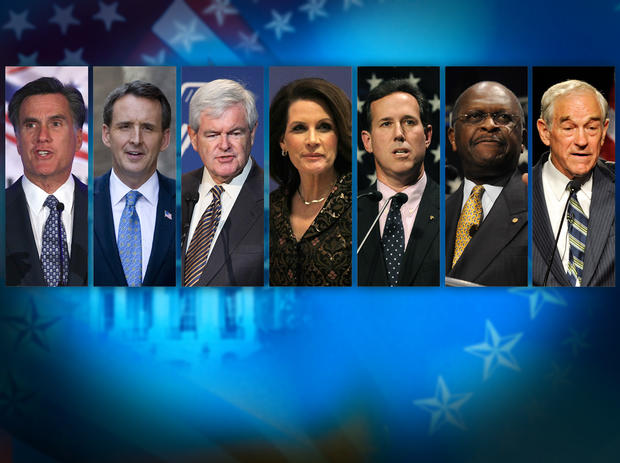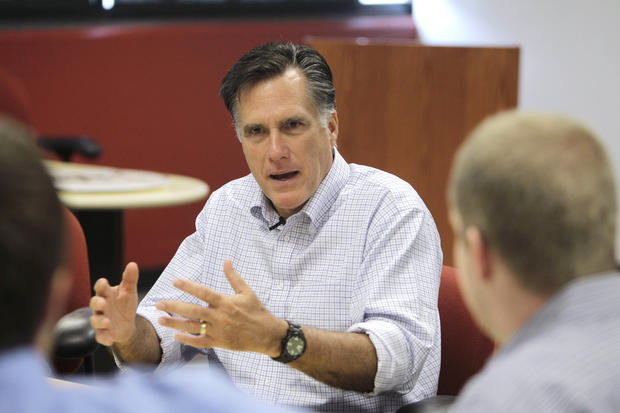The Republican debate: 10 things to watch
For the first time, all the major Republicans will show up to debate in New Hampshire tonight, probably marking official kickoff to the presidential campaign. Here's 10 things to watch:
1. National vs. Local: Who Can Balance Best?
With so many of the candidates unknown to Republicans nationwide, there's an urgency to build national name recognition -- voters in Iowa, South Carolina and elsewhere will be watching too. But Granite State primary voters will be ones getting a shot to ask questions tonight, and New Hampshire voters have earned their reputation for independence from national trends. In fact, no non-incumbent Republican has won both Iowa and then the New Hampshire Primary.
2. Mitt Romney: Is he all-in now in New Hampshire?
Speaking of which -- Romney's decision to skip the Iowa straw poll this summer is being read as his lowering of expectations in the caucuses this time around. So there'll be more emphasis - and maybe more pressure on him -- to win New Hampshire. New Hampshire Republicans are more fiscally conservative than socially conservative, so Romney's efforts here play along with his focusing the attack on President Obama on the economy.
3. Is there a frontrunner - or will anyone be treated that way?
...Which leads to the question of frontrunner status. For a while now, other candidates have treated Mitt Romney as the "frontrunner" thus far. Tim Pawlenty even said as much. In debates, that can mean drawing some fire from the pack. Will anyone go after Romney, or will the others decide it's still too early for that approach? Pawlenty previewed his attack on Romney's vulnerability over health care, calling it Obamneycare - attacking Romney's plan as being the basis for the health care reform law that is hated by the GOP.
4. Is there any room to oppose Medicare changes?
And speaking of health care policy... Many candidates have either backed GOP Rep. Paul Ryan's proposals for Medicare -- or at least not criticized them. And most rank-and-file Republican voters, in turn, also support changing the program that way - but not all. More than a quarter don't. In a crowded field where a candidate can win a state with one-third of the vote or so, will anyone try that angle? Newt Gingrich did momentarily, then backed off. (And another thing - older voters tend to be more resistant to the idea of changing it. And in 2008, just about half of NH primary voters were over 50.)
Poll: Most want Medicare changes, but wary of GOP plan
5. Which voters are the targets?
That brings up another thing to remember: Crowded primary contests - especially early ones - can often be won with around one-third of the vote. So candidates don't need to win over everyone, or even a majority, but rather must put together enough of a coalition to get to that level. As they discuss policies, listen for which voters their answers might appeal to: the moderates? Social or fiscal conservatives? Older? Younger? That'll be a good clue to their campaign strategy going forward.
6. What's the Tea Party factor?
Republican voters nationwide say it doesn't matter much to them whether their nominee hails from the Tea Party or not. But Tea Party activists are sure to play a key role in this process, especially early on. Keep an eye on which candidates embrace and court the Tea Party by name, or if any avoid doing so.
7. New Hampshire has lots of Independents, yes... but don't forget there's plenty of conservatives, too.
We'll hear a lot about New Hampshire primary voters being more independent and moderate, especially compared to Iowa's, and how those groups are important. True. But in 2008 New Hampshire was still mostly made up of conservatives (55%) even if not as staunchly so, and of Republicans (61%) as opposed to Independents (37%.)
All of them agree that President Obama must go, but what specifically will they say they're going to do about it? Some of the best moments in debates come from the unknown. What happens if, for example, Michele Bachmann, Rick Santorum or Ron Paul announce a significant policy plan and the other candidates don't have a response? And how candidates respond on their feet to their opponents' ideas can be a good early measure of who's serious or not.
9. If attacked, will anyone try to "rise above the fray?"
Tim Pawlenty unveiled his own economic plan this week and drew some criticism that it was unrealistic or overly optimistic; but how far can Romney and others go to criticize Pawlenty without legitimizing his proposal? While Romney will certainly face tough questions and snarky asides about his Massachusetts health care plan, watch for how - or whether -- the other candidates attack each other. Moreover, for candidates like Romney and, perhaps, Pawlenty - two candidates doing well in either fundraising, the polls, or both - being able to rise above the fray when attacked and "look presidential" is often a goal in these early debates.
10. And finally, remember: In the early polls, opinions can matter, but vote choice doesn't.
Remember the summer of 2007? You might remember Spider-Man 3 was atop the box office...or the famous final episode of the Sopranos... And that Rudy Giuliani and Fred Thompson were polling very well among primary voters...


